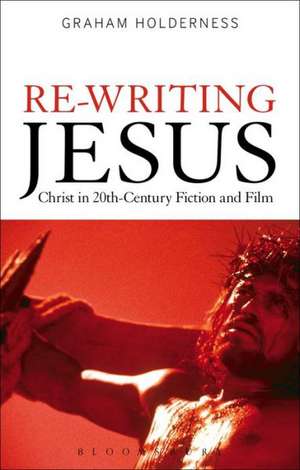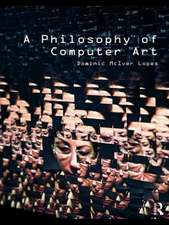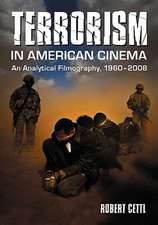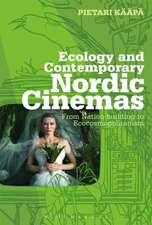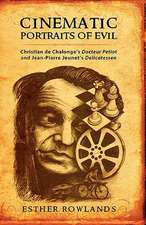Re-Writing Jesus: Christ in 20th-Century Fiction and Film
Autor Professor Graham Holdernessen Limba Engleză Hardback – 19 noi 2014
| Toate formatele și edițiile | Preț | Express |
|---|---|---|
| Paperback (1) | 179.10 lei 3-5 săpt. | |
| Bloomsbury Publishing – 19 noi 2014 | 179.10 lei 3-5 săpt. | |
| Hardback (1) | 568.40 lei 6-8 săpt. | |
| Bloomsbury Publishing – 19 noi 2014 | 568.40 lei 6-8 săpt. |
Preț: 568.40 lei
Preț vechi: 726.21 lei
-22% Nou
Puncte Express: 853
Preț estimativ în valută:
108.78€ • 112.60$ • 91.94£
108.78€ • 112.60$ • 91.94£
Carte tipărită la comandă
Livrare economică 05-19 martie
Preluare comenzi: 021 569.72.76
Specificații
ISBN-13: 9781472573322
ISBN-10: 1472573323
Pagini: 264
Dimensiuni: 138 x 216 x 23 mm
Greutate: 0.48 kg
Editura: Bloomsbury Publishing
Colecția Bloomsbury Academic
Locul publicării:London, United Kingdom
ISBN-10: 1472573323
Pagini: 264
Dimensiuni: 138 x 216 x 23 mm
Greutate: 0.48 kg
Editura: Bloomsbury Publishing
Colecția Bloomsbury Academic
Locul publicării:London, United Kingdom
Caracteristici
Covers such works as Dan Brown's The Da Vinci Code, Jim Crace's Quarantine, Mel Gibson's Passion of the Christ and many others
Notă biografică
Graham Holderness is Professor of English at the University of Hertfordshire, UK, author or editor of numerous studies in early modern and modern literature and drama, and General Editor of the peer-reviewed journal Critical Survey. He is also a creative writer, novelist and award-winning poet and his previous books include Nine Lives of William Shakespeare (2010).
Cuprins
Introduction1. 'Half God, Half Man': Nikos Kazantsakis' The Last Temptation and Martin Scorsese's The Last Temptation of Christ2. Human and Sacred: Anthony Burgess's Man of Nazareth and Franco Zefirelli's Jesus of Nazareth3. Science and Religion: Jim Crace's Quarantine4. Cross and Altar: Mel Gibson's The Passion of the Christ5. God or Man?: Mark Dornford-May's Son of Man6. Ecce Homo: A Life of ChristBibliographyIndex
Recenzii
No-one interested in the presentation of Christ in modern fiction and film should miss [this book].
This book's first part makes an immensely useful contribution to the increasing volume of works covering the interface between theology and film. Taken together with Holderness's own novella, it does demonstrate that it is not only possible but also fruitful to explore the dual nature of Christ in a fictional literary vehicle.
Re-writing Jesus is a rare and refreshing example of how rigorous scholarship can inform and strengthen imaginative art. . This is quite a different kind of scholarly work. It is rigorous in attention to texts and sources and historical precedents, but it is also the starting point for a creative encounter with implications for today. Holderness studies in order to be inspired, to be renewed, to find something to share with others. . This would make a great supplemental text within a religion and film or religion and literature class. It is written in a learned but lucid style that undergraduates or seminary students would find accessible. .. Graham Holderness is an encouraging companion in endeavoring to unite what academia repeatedly strives to divide: faith and doubt, the ancient and the contemporary, rigorous analysis and creative response.
Re-Writing Jesus is an unusual, provocative, theologically well-informed, and sensitive study of a Christ 'without form nor comeliness', existing for Holderness far beyond the word or image.
One of the most balanced and scholarly analyses of Jesus-fictions ever produced. Well-argued and strongly supported, Re-writing Jesus is an invaluable addition to the fields of both Christ studies and popular culture studies.
This is in a quite different class of originality and excellence from anything so far written about the fictional transformations of Jesus' life. Acute analysis of a wide variety of novels, films and plays is combined with a rare sensitivity to the large underlying issues not only about the nature of doctrine but about religious language itself as it works and fails to work and reinvents itself in modern culture. A really stimulating and welcome book.
In Holderness' book we encounter, with historical and theological sureness of touch, the Jesus who mysteriously persists in contemporary film and fiction. Beginning with The Da Vinci Code, Holderness takes us back to the nineteenth century, and through the fiction of George Moore, leads us into the theological terrain of the late twentieth century. For readers who have never progressed much beyond Dan Brown, this book will be a fascinating journey into the continuing power of the central figure of the gospels in the culture of our time.
Re-writing Jesus shows Jesus to be much more among us than we knew, kicking in the womb and on his cross in so much contemporary film and fiction. But Graham Holderness also demonstrates that such reincarnations are part of a neglected 'great tradition' stretching back to Renan's Vie de Jesus. Holderness takes that tradition more than usually seriously, showing what it can do for theology. He even goes so far as to supplement it himself, in Ecce Homo, his original life of Christ, which is distinctive in really taking on the imaginative challenge of what it would mean to be both divine and human. Lucid, learned, and above all alive, this is a magnetic book.
Deeply learned and splendidly accessible, Graham Holderness's brilliant book serves as a fair-minded and thoughtful guide on the quest for last century's literary and cinematic Jesus. Here, readers will find a plurality of Jesus - and Christ - figures on display, each one revealing as much, if not more, about the novelist or the auteur as they do about the Nazarene. Re-writing Jesus is a theological tour de force!
Every generation or so, Jesus must be re-written, re-imaged, and re-heard. Such cultural resurrections always carry with them the possibility of misrecognition, and so we need a guide to point the way. Graham Holderness proves an astute and alert docent as he travels with us on the Road to Emmaus, allowing us to recognize the re-written Jesus in film and novels of the past century. Along the way Holderness reveals the sacred in science, sacrifice in cinema, and ends with a poetically charged Jesus for the twenty-first century.
This book's first part makes an immensely useful contribution to the increasing volume of works covering the interface between theology and film. Taken together with Holderness's own novella, it does demonstrate that it is not only possible but also fruitful to explore the dual nature of Christ in a fictional literary vehicle.
Re-writing Jesus is a rare and refreshing example of how rigorous scholarship can inform and strengthen imaginative art. . This is quite a different kind of scholarly work. It is rigorous in attention to texts and sources and historical precedents, but it is also the starting point for a creative encounter with implications for today. Holderness studies in order to be inspired, to be renewed, to find something to share with others. . This would make a great supplemental text within a religion and film or religion and literature class. It is written in a learned but lucid style that undergraduates or seminary students would find accessible. .. Graham Holderness is an encouraging companion in endeavoring to unite what academia repeatedly strives to divide: faith and doubt, the ancient and the contemporary, rigorous analysis and creative response.
Re-Writing Jesus is an unusual, provocative, theologically well-informed, and sensitive study of a Christ 'without form nor comeliness', existing for Holderness far beyond the word or image.
One of the most balanced and scholarly analyses of Jesus-fictions ever produced. Well-argued and strongly supported, Re-writing Jesus is an invaluable addition to the fields of both Christ studies and popular culture studies.
This is in a quite different class of originality and excellence from anything so far written about the fictional transformations of Jesus' life. Acute analysis of a wide variety of novels, films and plays is combined with a rare sensitivity to the large underlying issues not only about the nature of doctrine but about religious language itself as it works and fails to work and reinvents itself in modern culture. A really stimulating and welcome book.
In Holderness' book we encounter, with historical and theological sureness of touch, the Jesus who mysteriously persists in contemporary film and fiction. Beginning with The Da Vinci Code, Holderness takes us back to the nineteenth century, and through the fiction of George Moore, leads us into the theological terrain of the late twentieth century. For readers who have never progressed much beyond Dan Brown, this book will be a fascinating journey into the continuing power of the central figure of the gospels in the culture of our time.
Re-writing Jesus shows Jesus to be much more among us than we knew, kicking in the womb and on his cross in so much contemporary film and fiction. But Graham Holderness also demonstrates that such reincarnations are part of a neglected 'great tradition' stretching back to Renan's Vie de Jesus. Holderness takes that tradition more than usually seriously, showing what it can do for theology. He even goes so far as to supplement it himself, in Ecce Homo, his original life of Christ, which is distinctive in really taking on the imaginative challenge of what it would mean to be both divine and human. Lucid, learned, and above all alive, this is a magnetic book.
Deeply learned and splendidly accessible, Graham Holderness's brilliant book serves as a fair-minded and thoughtful guide on the quest for last century's literary and cinematic Jesus. Here, readers will find a plurality of Jesus - and Christ - figures on display, each one revealing as much, if not more, about the novelist or the auteur as they do about the Nazarene. Re-writing Jesus is a theological tour de force!
Every generation or so, Jesus must be re-written, re-imaged, and re-heard. Such cultural resurrections always carry with them the possibility of misrecognition, and so we need a guide to point the way. Graham Holderness proves an astute and alert docent as he travels with us on the Road to Emmaus, allowing us to recognize the re-written Jesus in film and novels of the past century. Along the way Holderness reveals the sacred in science, sacrifice in cinema, and ends with a poetically charged Jesus for the twenty-first century.
